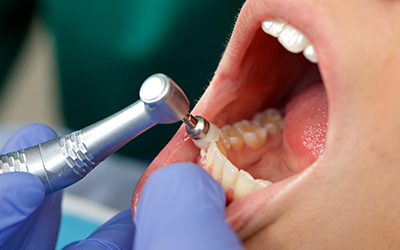Cavities & Tooth Decay
Do you suffer from tooth pain? Several issues, including sensitivity, can cause tooth pain. However, tooth cavities, a more severe case, can cause discomfort and pain, leading to tooth loss. Dental cavities are permanently damaged areas on the surface of your teeth, exposing the bone and nerve.
Causes and Symptoms
Cavities, also known as tooth decay or caries, are caused by a combination of factors. Cavities form from bacteria in your mouth. Foods high in sugar, poor oral hygiene, or simple genetics can increase bacteria in your mouth. The following provides the general timeline a cavity forms:
- Plaque Build Up. Dental plaque is a transparent sticky film that adheres to your teeth formed from food. Plaque builds up much quicker with foods high in sugars and starches. Daily oral hygiene routines help clear away plaque. However, bacteria will feed on sugars and starches that remain, forming plaque. As plaque is allowed to remain, tartar is formed. Tartar makes plaque more difficult to remove and creates a shield for bacteria to thrive.
- Plaque & Decay. Acids in plaque will erode minerals in your tooth's enamel. Enough erosion will create tiny holes through the tooth's enamel and expose the inner core of the tooth. Bacteria and acid can reach the next layer of your teeth once a hole is created. Dentin is the soft inner part of the tooth composed of microscopic channels that help control tooth sensitivity.
- Tooth Decay. As tooth decay continues to develop, the bacteria and acid continue eroding to the next layer of the tooth - the pulp. The pulp contains blood vessels and becomes swollen as bacteria infects the innermost part of the tooth. Soon swelling occurs within the tooth's center, causing pain and discomfort.
A dental cavity during the early stage may exhibit no signs or symptoms. However, as the tooth decay grows, it may cause the following symptoms:
- Toothache
- Spontaneous tooth pain without any apparent cause
- Increased tooth sensitivity
- Sharp pain when eating or drinking something sweet, hot, or cold
- Visible holes or pits in the teeth
- Brown, black or white staining on any surface of a tooth
- Pain when you bite down
When to see a Dentist
You may not be aware a tooth cavity is forming. To avoid moderate to severe tooth pain or to evade a tooth abscess from forming, it's essential to have regular dental checkups and cleanings every 6 to 12 months. Even when you feel fine, a cavity may form without indication. However, if you are experiencing a toothache or mouth pain, see your dentist as soon as possible.
In most cases, tooth cavities are filled in to prevent further decay. Teeth can be filled with gold; porcelain; silver amalgam, tooth-colored plastic, or materials called composite resin fillings. At Severance Dental, we use BPA-free fillings. Our dentist will help you choose the best solution for your situation.
Do Cavities Matter?
It's vital to take cavities and tooth decay seriously, even in young children and youth. Dental cavities, even in baby's teeth, can have severe and lasting complications. Complications of cavities may include:
- Pain
- Swelling
- Tooth damage and adjacent tooth damage
- Chewing problems
- Shifts teeth after tooth loss - which can lead to facial deformations, speech problems, chipping or breaking teeth, and jaw issues, including TMJ.
- A tooth abscess (when puss forms from bacteria and becomes trapped under the gums or inside the tooth). An abscess can cause severe pain and lead to more serious health conditions - even life-threatening infections.
Dental Cavity Prevention
Dental cavity prevention begins with a daily oral and dental hygiene program. Here are some tips to help prevent cavities.
- Brush with fluoride toothpaste. Using fluoride toothpaste, brush your teeth at least twice daily and ideally after every meal.
- Visit our dentist regularly. A dental cleaning & exam can help identify issues early on and help remove hard to reach plaque.
- Dental sealants. Dental sealants are an option for protecting teeth that utilize a protective plastic coating over the teeth. Sealants may last several years before needing to be replaced, but they must be checked regularly.
- Avoid frequent snacking and sipping. Eating and drinking beverages other than water helps create bacteria and acids that can destroy tooth enamel. Your teeth are constantly attacked if you snack or drink throughout the day.
- Eat tooth-healthy foods. Some foods and beverages are better for your teeth than others. Avoid foods high in sugar or that stick easily within the grooves and pits of your teeth. Fresh fruits and vegetables increase saliva flow and help wash away food particles.
Teeth Cleaning & Exam
Consider regular dental cleanings and exams to help you avoid tooth cavities and tooth decay. Employing a daily dental hygiene routine is a significant first step. However, not all plaque can be removed using at-home care, and cavities can secretly develop. Tooth decay can cause severe issues in adults and even young children when not treated professionally - even life-threatening conditions. Schedule an appointment with Severance Dental today.
Our Blog
We don’t only care about your smile, We care about you! Follow us on our blog to review trending topic and resources for oral care.














